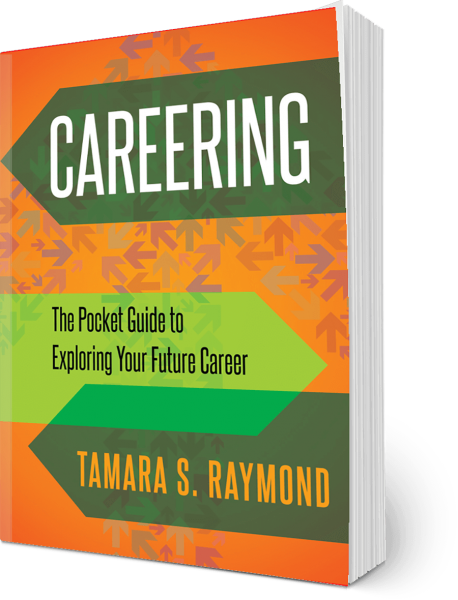 An old saying goes, “Man does not eat by bread alone”—in other words, we all need more than basic necessities to thrive. Apply this concept to finding the right career—a journey that involves career exploration, career development, self-development, and self-improvement—and it conveys that we must do more than make good money to be happy in our work. The truly successful person makes good money and LOVES the work they do too.
An old saying goes, “Man does not eat by bread alone”—in other words, we all need more than basic necessities to thrive. Apply this concept to finding the right career—a journey that involves career exploration, career development, self-development, and self-improvement—and it conveys that we must do more than make good money to be happy in our work. The truly successful person makes good money and LOVES the work they do too.
What is Career Exploration?
Career Exploration is the exercise of discovering career and job alternatives that match a person’s skills and interests and reviewing the primary aspects of the employment search to help get a person where they want to get.
How Do You Find That Career Balance?
You can get on the road to work happiness well before you step foot in college, vocational school, and graduate from high school. The first step begins with discovering what you love to do and what you are good at doing by way of career exploration. One way to do this is to take a Birkman questionnaire, a comprehensive personality and interest assessment that, in my own personal experience, is a great career development tool. My Birkman assessment ultimately led to me finding the right career, and it could potentially do the same for you. Learn more about Birkman at the links in this paragraph. Meanwhile, let’s focus on some general career exploration concepts.
Career Exploration for Students
As a high schooler, learn what you love to do and are good at doing by attending summer camps, working in a variety of jobs, and volunteering in various organizations. Ask yourself what you liked most about the camps, the jobs, and the volunteer work, and write down your responses, which can help you with your self-development and career development. Your answers will give you insight into what type of careers may be right for you [Follow Your Passion to Find Your Career – IMC Leaders].

 Part of your career exploration process may also include informally interviewing a professional working in a career that you are interested in; this is something I highly recommend you do before applying to college. That’s because the “interview” could reveal that you are less interested in a math-related career, for instance, than you previously thought; such a discovery could inspire you to apply to colleges that have stronger offerings in subject matters other than math (or whatever subject you thought you were interested in). That being said, consider these interview tips for an informal interaction with a professional:
Part of your career exploration process may also include informally interviewing a professional working in a career that you are interested in; this is something I highly recommend you do before applying to college. That’s because the “interview” could reveal that you are less interested in a math-related career, for instance, than you previously thought; such a discovery could inspire you to apply to colleges that have stronger offerings in subject matters other than math (or whatever subject you thought you were interested in). That being said, consider these interview tips for an informal interaction with a professional:
Your meeting could take various forms, from a phone or in-person interview to a Zoom interview. Interview etiquette: If it’s a visual interview, make sure to dress well. Regardless of interview format, ask the professional about various topics, including what type of education was required to qualify for the job, how long they’ve been in the job, the highlights of what they do, and what they consider to be the great parts and not-so great parts of their job. Ask them if they like, love, or dislike their work and why. In their responses, you may recognize similarities to yourself; for instance, they may say they like the work because it is “fast paced,” and you may realize that you’ve always loved fast-paced assignments, which could be a clue that their work could be appropriate for you too.
If you’re in college and only now discovering your work likes and dislikes, find some time to pursue extracurricular activities that will give you further insight into what you’d like to do for a living. If you are really pressed for time, these activities don’t have to be long term. Joining the college newspaper as a staff writer, for example, is likely a longer commitment than volunteering to write press releases for the annual spring flower show. So pick activities that will fit your available time and explore! Write down your discoveries about your likes, dislikes, and what you excelled at doing as part of your career exploration process.
Once you find an extracurricular pursuit (or two) that you really enjoy participating in, stick with it through the rest of your college years if you can or until you stop learning from the activity—this is a tip for how to network in college. A longer-term experience will raise the likelihood of you making long-term friends in the same work field and could result in “ready-made” work connections down the road; a longer experience could also help you gain skills that you could later apply in a real-world work setting, a situation that could expedite your journey up the work ladder if you’ve already mastered many entry-level work concepts through your extracurricular pursuit.
In addition to participating in extracurricular activities, it’s also great to link up with mentors inside and outside the academic setting. A college mentor can come in many forms, including someone who is similar in age to you. For instance, it could be an RA (resident assistant) who has participated in internships in a field you’re interested in; I have a friend whose RA interned in the same field she wanted to enter, and she related to me how he shared strong career advice with her. As for a mentor outside the academic setting, look for a professional or two in career fields you’re considering. Set up a schedule with them to touch base about your questions. Depending on the time they can give you, this could be as simple as emailing them, having a monthly Zoom call, or meeting them over coffee once a quarter. Always come to the table with plenty of questions and an openness to learn as this will aid in your career development process.

Career Exploration for Adults
If you’ve graduated from college or vocational school, worked in a few jobs, and found yourself fairly or completely unhappy at work, it’s time to reboot. Despite the circumstances, keep doing your best at work, but in your free time, start exploring your interests. Just like the high schooler and the college student, write down a list of things you like to do, then find activities that will allow you to explore them. This will all be part of your career development plan.
For instance, if you love to take photographs, check whether your local community college or another organization offers photography courses. If you take classes and discover that you truly have a talent for photography, the next step of your career development plan should be to start researching careers that take advantage of this skill. Talk with people in those careers and learn what jobs your prior work experience, combined with your new photography skill set, qualifies you for. Speak with people in your workplace too and learn about other jobs you can do there. Perhaps you’ll find that you don’t have to change workplaces, just the job you do for your current employer.
On the other hand, say job options are limited in your workplace. Let’s look at the example of working for a small lawn work company where the only person with an “indoors” job is the company owner. As you’ve worked for this small outfit, you’ve discovered that you can’t stand being outside in the hot summer months, in the mild months of spring and fall, and especially in the winter. In short, you don’t like working outside! If this is the case, it’s time for introspection, which is all part of the personal growth and professional development work that is part of career exploration. As you examine your likes and dislikes, you realize that if you could spend all your time on Facebook and Twitter commenting about the latest fashion releases inside the comfort of an office or your living room, you’d be in heaven. Bingo! Sounds like it’s time for you to explore social media and fashion-related career options.

What Does It Mean to “Explore” a New Career When You’re an Adult?
Unlike a teen or young college grad, you may have major personal responsibilities, such as a house, a spouse, and children. So while you may want to step away from the lawn work, you may need to continue in that job and find some hours outside of your 9-to-5 to work in another field. Some fields are easier than others to dip a toe in. For instance, setting out on that fashion-related career could begin right at home by way of starting a YouTube channel; in this self-directed work, you could set your own work schedule and the rest of your investment could be quite minimal. Basically, the work requires a decent video camera, the internet, a willingness to learn what makes a channel lucrative, the desire to learn how to present yourself in the best and most interesting light, and the patience to learn editing skills. Others looking at fields that are not self-directed and/or that may require showing up to a physical workplace, however, should take this networking advice: Tap into your work and social network for beneficial connections that could translate into a good part-time work opportunity that would allow you to explore a potential career.
Remember, it’s never too late to start discovering who you are and what you love to do so that you can find the right career for you. Here’s to career exploration and self-improvement! Cheers!
